- Home
- Roald Dahl
The Best of Roald Dahl Page 13
The Best of Roald Dahl Read online
Page 13
She now turned to one of the Liszt biographies, and she was glancing through it casually when her husband came in again from the garden.
'What are you doing now?' he asked.
'Oh - just checking up a little here and there. Listen, my dear, did you know that Theodore Roosevelt once was Caesar's wife?'
'Louisa,' he said, 'look - why don't we stop this nonsense? I don't like to see you making a fool of yourself like this. Just give me that goddam cat and I'll take it to the police station myself.'
Louisa didn't seem to hear him. She was staring open-mouthed at a picture of Liszt in the book that lay on her lap. 'My God!' she cried. 'Edward, look!'
'What?'
'Look! The warts on his face! I forgot all about them! He had these great warts on his face and it was a famous thing. Even his students used to cultivate little tufts of hair on their own faces in the same spots, just to be like him.'
'What's that got to do with it?'
'Nothing. I mean not the students. But the warts have.'
'Oh, Christ,' the man said. 'Oh, Christ God Almighty.'
'The cat has them, too! Look, I'll show you.'
She took the animal on to her lap and began examining its face. 'There! There's one! And there's another! Wait a minute! I do believe they're in the same places! Where's that picture?'
It was a famous portrait of the musician in his old age, showing the fine powerful face framed in a mass of long grey hair that covered his ears and came halfway down his neck. On the face itself, each large wart had been faithfully reproduced, and there were five of them in all.
'Now, in the picture there's one above the right eyebrow.' She looked above the right eyebrow of the cat. 'Yes! It's there! In exactly the same place! And another on the left, at the top of the nose. That one's there, too! And one just below it on the cheek. And two fairly close together under the chin on the right side. Edward! Edward! Come and look! They're exactly the same.'
'It doesn't prove a thing.'
She looked up at her husband who was standing in the centre of the room in his green sweater and khaki slacks, still perspiring freely. 'You're scared, aren't you, Edward? Scared of losing your precious dignity and having people think you might be making a fool of yourself just for once.'
'I refuse to get hysterical about it, that's all.'
Louisa turned back to the book and began reading some more. 'This is interesting,' she said. 'It says here that Liszt loved all of Chopin's works except one - the Scherzo in B flat minor. Apparently he hated that. He called it the "Governess Scherzo", and said that it ought to be reserved solely for people in that profession.'
'So what?'
'Edward, listen. As you insist on being so horrid about all this, I'll tell you what I'm going to do. I'm going to play this scherzo right now and you can stay here and see what happens.'
'And then maybe you will deign to get us some supper.'
Louisa got up and took from the shelf a large green volume containing all of Chopin's works. 'Here it is. Oh yes, I remember it. It is rather awful. Now, listen - or, rather, watch. Watch to see what he does.'
She placed the music on the piano and sat down. Her husband remained standing. He had his hands in his pockets and a cigarette in his mouth, and in spite of himself he was watching the cat, which was now dozing on the sofa. When Louisa began to play, the first effect was as dramatic as ever. The animal jumped up as though it had been stung, and it stood motionless for at least a minute, the ears pricked up, the whole body quivering. Then it became restless and began to walk back and forth along the length of the sofa. Finally, it hopped down on to the floor, and with its nose and tail held high in the air, it marched slowly, majestically, from the room.
'There!' Louisa cried, jumping up and running after it. 'That does it! That really proves it!' She came back carrying the cat which she put down again on the sofa. Her whole face was shining with excitement now, her fists were clenched white, and the little bun on top of her head was loosening and going over to one side. 'What about it, Edward? What d'you think?' She was laughing nervously as she spoke.
'I must say it was quite amusing.'
'Amusing! My dear Edward, it's the most wonderful thing that's ever happened! Oh, goodness me!' she cried, picking up the cat again and hugging it to her bosom. 'Isn't it marvellous to think we've got Franz Liszt staying in the house?'
'Now, Louisa. Don't let's get hysterical.'
'I can't help it, I simply can't. And to imagine that he's actually going to live with us for always!'
'I beg your pardon?'
'Oh, Edward! I can hardly talk from excitement. And d'you know what I'm going to do next? Every musician in the whole world is going to want to meet him, that's a fact, and ask him about the people he knew - about Beethoven and Chopin and Schubert -'
'He can't talk,' her husband said.
'Well - all right. But they're going to want to meet him anyway, just to see him and touch him and to play their music to him, modern music he's never heard before.'
'He wasn't that great. Now, if it had been Bach or Beethoven ...'
'Don't interrupt, Edward, please. So what I'm going to do is to notify all the important living composers everywhere. It's my duty. I'll tell them Liszt is here, and invite them to visit him. And you know what? They'll come flying in from every corner of the earth!'
'To see a grey cat?'
'Darling, it's the same thing. It's him. No one cares what he looks like. Oh, Edward, it'll be the most exciting thing there ever was!'
'They'll think you're mad.'
'You wait and see.' She was holding the cat in her arms and petting it tenderly but looking across at her husband, who now walked over to the French windows and stood there staring out into the garden. The evening was beginning, and the lawn was turning slowly from green to black, and in the distance he could see the smoke from his bonfire rising straight up in a white column.
'No,' he said, without turning round, 'I'm not having it. Not in this house. It'll make us both look perfect fools.'
'Edward, what do you mean?'
'Just what I say. I absolutely refuse to have you stirring up a lot of publicity about a foolish thing like this. You happen to have found a trick cat. O.K. - that's fine. Keep it, if it pleases you. I don't mind. But I don't wish you to go any further than that. Do you understand me, Louisa?'
'Further than what?'
'I don't want to hear any more of this crazy talk. You're acting like a lunatic'
Louisa put the cat slowly down on the sofa. Then slowly she raised herself to her full small height and took one pace forward. 'Damn you, Edward!' she shouted, stamping her foot. 'For the first time in our lives something really exciting comes along and you're scared to death of having anything to do with it because someone may laugh at you! That's right, isn't it? You can't deny it, can you?'
'Louisa,' her husband said. 'That's quite enough of that. Pull yourself together now and stop this at once.' He walked over and took a cigarette from the box on the table, then lit it with the enormous patent lighter. His wife stood watching him, and now the tears were beginning to trickle out of the inside corners of her eyes, making two little shiny rivers where they ran through the powder on her cheeks.
'We've been having too many of these scenes just lately, Louisa,' he was saying. 'No no, don't interrupt. Listen to me. I make full allowance for the fact that this may be an awkward time of life for you, and that -'
'Oh, my God! You idiot! You pompous idiot! Can't you see that this is different, this is - this is something miraculous? Can't you see that?'
At that point, he came across the room and took her firmly by the shoulders. He had the freshly lit cigarette between his lips, and she could see faint contours on his skin where the heavy perspiration had dried in patches. 'Listen,' he said. 'I'm hungry. I've given up my golf and I've been working all day in the garden, and I'm tired and hungry and I want some supper. So do you. Off you go now to the kitchen and get us both
something good to eat.'
Louisa stepped back and put both hands to her mouth. 'My heavens!' she cried. 'I forgot all about it. He must be absolutely famished. Except for some milk, I haven't given him a thing to eat since he arrived.'
'Who?'
'Why, him, of course. I must go at once and cook something really special. I wish I knew what his favourite dishes used to be. What do you think he would like best, Edward?'
'Goddam it, Louisa!'
'Now, Edward, please. I'm going to handle this my way just for once. You stay here,' she said, bending down and touching the cat gently with her fingers. 'I won't be long.'
Louisa went into the kitchen and stood for a moment, wondering what special dish she might prepare. How about a souffle? A nice cheese souffle? Yes, that would be rather special. Of course, Edward didn't much care for them, but that couldn't be helped.
She was only a fair cook, and she couldn't be sure of always having a souffle come out well, but she took extra trouble this time and waited a long while to make certain the oven had heated fully to the correct temperature. While the souffle was baking and she was searching around for something to go with it, it occurred to her that Liszt had probably never in his life tasted either avocado pears or grapefruit, so she decided to give him both of them at once in a salad. It would be fun to watch his reaction. It really would.
When it was all ready, she put it on a tray and carried it into the living-room. At the exact moment she entered, she saw her husband coming in through the French windows from the garden.
'Here's his supper,' she said, putting it on the table and turning towards the sofa. 'Where is he?'
Her husband closed the garden door behind him and walked across the room to get himself a cigarette.
'Edward, where is he?'
'Who?'
'You know who.'
'Ah, yes. Yes, that's right. Well - I'll tell you.' He was bending forward to light the cigarette, and his hands were cupped around the enormous patent lighter. He glanced up and saw Louisa looking at him - at his shoes and the bottoms of his khaki slacks, which were damp from walking in the long grass.
'I just went to see how the bonfire was going,' he said.
Her eyes travelled slowly upward and rested on his hands.
'It's still burning fine,' he went on. 'I think it'll keep going all night.'
But the way she was staring made him uncomfortable.
'What is it?' he said, lowering the lighter. Then he looked down and noticed for the first time the long thin scratch that ran diagonally clear across the back of one hand, from the knuckle to the wrist.
'Edward!'
'Yes,' he said, 'I know. Those brambles are terrible. They tear you to pieces. Now, just a minute, Louisa. What's the matter?'
'Edward!'
'Oh, for God's sake, woman, sit down and keep calm. There's nothing to get worked up about. Louisa! Louisa, sit down!'
Lamb to the Slaughter
[1953]
The room was warm and clean, the curtains drawn, the two table lamps alight - hers and the one by the empty chair opposite. On the sideboard behind her, two tall glasses, soda water, whisky. Fresh ice cubes in the Thermos bucket.
Mary Maloney was waiting for her husband to come home from work.
Now and again she would glance up at the clock, but without anxiety, merely to please herself with the thought that each minute gone by made it nearer the time when he would come. There was a slow smiling air about her, and about everything she did. The drop of the head as she bent over her sewing was curiously tranquil. Her skin - for this was her sixth month with child - had acquired a wonderful translucent quality, the mouth was soft, and the eyes, with their new placid look, seemed larger, darker than before.
When the clock said ten minutes to five, she began to listen, and a few moments later, punctually as always, she heard the tyres on the gravel outside, and the car door slamming, the footsteps passing the window, the key turning in the lock. She laid aside her sewing, stood up, and went forward to kiss him as he came in.
'Hullo darling,' she said.
'Hullo,' he answered.
She took his coat and hung it in the closet. Then she walked over and made the drinks, a strongish one for him, a weak one for herself; and soon she was back again in her chair with the sewing, and he in the other, opposite, holding the tall glass with both his hands, rocking it so the ice cubes tinkled against the side.
For her, this was always a blissful time of day. She knew he didn't want to speak much until the first drink was finished, and she, on her side, was content to sit quietly, enjoying his company after the long hours alone in the house. She loved to luxuriate in the presence of this man, and to feel - almost as a sunbather feels the sun - that warm male glow that came out of him to her when they were alone together. She loved him for the way he sat loosely in a chair, for the way he came in a door, or moved slowly across the room with long strides. She loved the intent, far look in his eyes when they rested on her, the funny shape of the mouth, and especially the way he remained silent about his tiredness, sitting still with himself until the whisky had taken some of it away.
'Tired darling?'
'Yes,' he said. 'I'm tired.' And as he spoke, he did an unusual thing. He lifted his glass and drained it in one swallow although there was still half of it, at least half of it left. She wasn't really watching him, but she knew what he had done because she heard the ice cubes falling back against the bottom of the empty glass when he lowered his arm. He paused a moment, leaning forward in the chair, then he got up and went slowly over to fetch himself another.
'I'll get it!' she cried, jumping up.
'Sit down,' he said.
When he came back, she noticed that the new drink was dark amber with the quantity of whisky in it.
'Darling, shall I get your slippers?'
'No.'
She watched him as he began to sip the dark yellow drink, and she could see little oily swirls in the liquid because it was so strong.
'I think it's a shame,' she said, 'that when a policeman gets to be as senior as you, they keep him walking about on his feet all day long.'
He didn't answer, so she bent her head again and went on with her sewing; but each time he lifted the drink to his lips, she heard the ice cubes clinking against the side of the glass.
'Darling,' she said. 'Would you like me to get you some cheese? I haven't made any supper because it's Thursday.'
'No,' he said.
'If you're too tired to eat out,' she went on, 'it's still not too late. There's plenty of meat and stuff in the freezer, and you can have it right here and not even move out of the chair.'
Her eyes waited on him for an answer, a smile, a little nod, but he made no sign.
'Anyway,' she went on, 'I'll get you some cheese and crackers first.'
'I don't want it,' he said.
She moved uneasily in her chair, the large eyes still watching his face. 'But you must have supper. I can easily do it here. I'd like to do it. We can have lamb chops. Or pork. Anything you want. Everything's in the freezer.'
'Forget it,' he said.
'But darling, you must eat! I'll fix it anyway, and then you can have it or not, as you like.'
She stood up and placed her sewing on the table by the lamp.
'Sit down,' he said. 'Just for a minute, sit down.'
It wasn't till then that she began to get frightened.
'Go on,' he said. 'Sit down.'
She lowered herself back slowly into the chair, watching him all the time with those large, bewildered eyes. He had finished the second drink and was staring down into the glass, frowning.
'Listen,' he said. 'I've got something to tell you.'
'What is it, darling? What's the matter?'
He had now become absolutely motionless, and he kept his head down so that the light from the lamp beside him fell across the upper part of his face, leaving the chin and mouth in shadow. She noticed there was a little
muscle moving near the corner of his left eye.
'This is going to be a bit of a shock to you, I'm afraid,' he said. 'But I've thought about it a good deal and I've decided the only thing to do is tell you right away. I hope you won't blame me too much.'
And he told her. It didn't take long, four or five minutes at most, and she sat very still through it all, watching him with a kind of dazed horror as he went further and further away from her with each word.
'So there it is,' he added. 'And I know it's kind of a bad time to be telling you, but there simply wasn't any other way. Of course I'll give you money and see you're looked after. But there needn't really be any fuss. I hope not anyway. It wouldn't be very good for my job.'
Her first instinct was not to believe any of it, to reject it all. It occurred to her that perhaps he hadn't even spoken, that she herself had imagined the whole thing. Maybe, if she went about her business and acted as though she hadn't been listening, then later, when she sort of woke up again, she might find none of it had ever happened.
'I'll get the supper,' she managed to whisper, and this time he didn't stop her.
When she walked across the room she couldn't feel her feet touching the floor. She couldn't feel anything at all - except a slight nausea and a desire to vomit. Everything was automatic now - down the steps to the cellar, the light switch, the deep freeze, the hand inside the cabinet taking hold of the first object it met. She lifted it out, and looked at it. It was wrapped in paper, so she took off the paper and looked at it again.
A leg of lamb.
All right then, they would have lamb for supper. She carried it upstairs, holding the thin bone-end of it with both her hands, and as she went through the living-room, she saw him standing over by the window with his back to her, and she stopped.
'For God's sake,' he said, hearing her, but not turning round. 'Don't make supper for me. I'm going out.'
At that point, Mary Maloney simply walked up behind him and without any pause she swung the big frozen leg of lamb high in the air and brought it down as hard as she could on the back of his head.

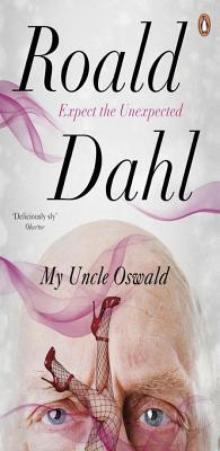 My Uncle Oswald
My Uncle Oswald The Best of Roald Dahl
The Best of Roald Dahl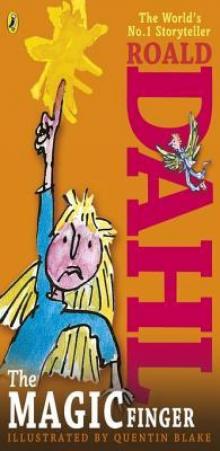 The Magic Finger
The Magic Finger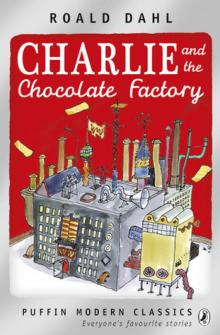 Charlie and the Chocolate Factory
Charlie and the Chocolate Factory Fantastic Mr Fox
Fantastic Mr Fox Matilda
Matilda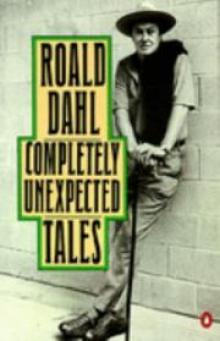 Completely Unexpected Tales: Tales of the Unexpected. More Tales of the Unexpected
Completely Unexpected Tales: Tales of the Unexpected. More Tales of the Unexpected The Wonderful Story of Henry Sugar and Six More
The Wonderful Story of Henry Sugar and Six More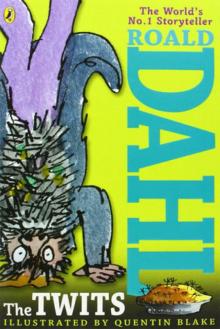 The Twits
The Twits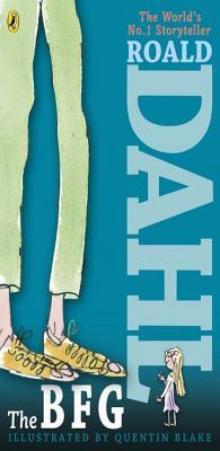 The BFG
The BFG Danny the Champion of the World
Danny the Champion of the World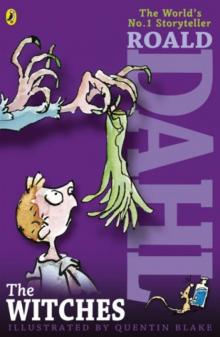 The Witches
The Witches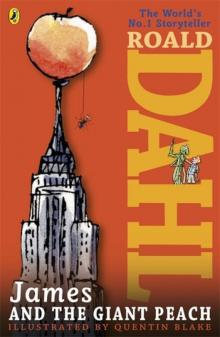 James and the Giant Peach
James and the Giant Peach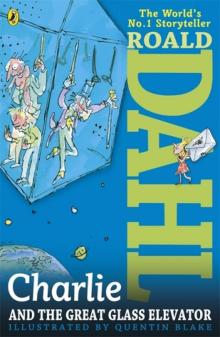 Charlie and the Great Glass Elevator
Charlie and the Great Glass Elevator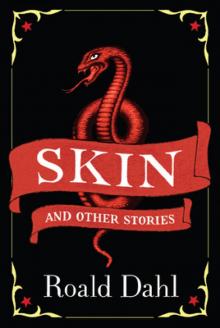 Skin and Other Stories
Skin and Other Stories Kiss Kiss
Kiss Kiss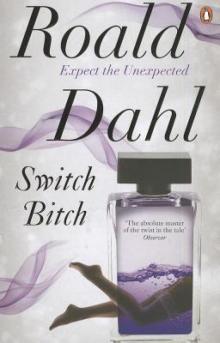 Switch Bitch
Switch Bitch The Giraffe and the Pelly and Me
The Giraffe and the Pelly and Me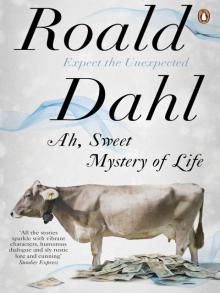 Ah, Sweet Mystery of Life
Ah, Sweet Mystery of Life Fear
Fear The Great Automatic Grammatizator and Other Stories
The Great Automatic Grammatizator and Other Stories Someone Like You
Someone Like You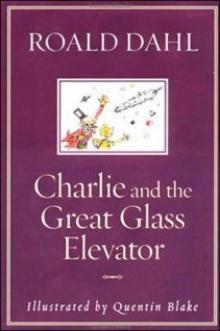 Charlie and the Great Glass Elevator c-2
Charlie and the Great Glass Elevator c-2 More About Boy
More About Boy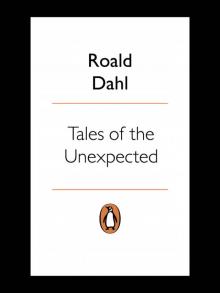 Tales of the Unexpected
Tales of the Unexpected The Umbrella Man and Other Stories
The Umbrella Man and Other Stories Dirty Beasts
Dirty Beasts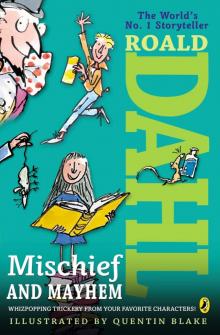 Roald Dahl's Mischief and Mayhem
Roald Dahl's Mischief and Mayhem The Collected Short Stories of Roald Dahl, Volume 1
The Collected Short Stories of Roald Dahl, Volume 1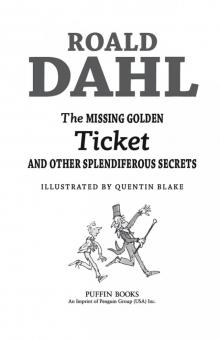 The Missing Golden Ticket and Other Splendiferous Secrets
The Missing Golden Ticket and Other Splendiferous Secrets Billy and the Minpins
Billy and the Minpins Over to You
Over to You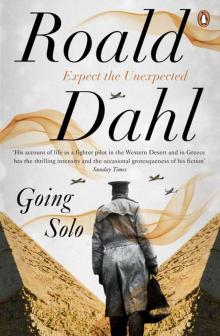 Going Solo
Going Solo Deception
Deception War
War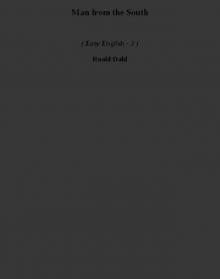 Man from the South ee-3
Man from the South ee-3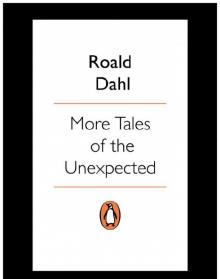 More Tales of the Unexpected
More Tales of the Unexpected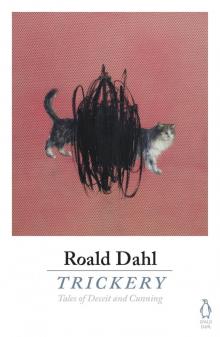 Trickery
Trickery Rhyme Stew
Rhyme Stew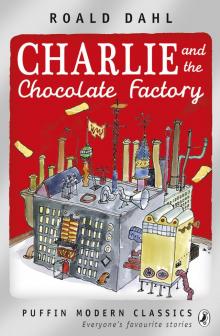 Charlie and the Chocolate Factory (Puffin Modern Classics relaunch)
Charlie and the Chocolate Factory (Puffin Modern Classics relaunch)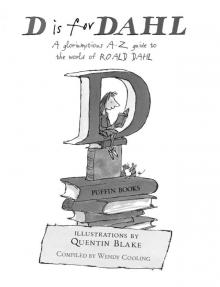 D is for Dahl
D is for Dahl Roald Dahl Whoppsy-Whiffling Joke Book
Roald Dahl Whoppsy-Whiffling Joke Book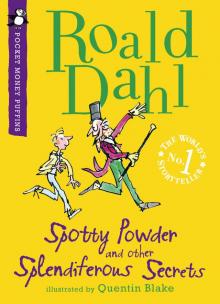 Spotty Powder and other Splendiferous Secrets
Spotty Powder and other Splendiferous Secrets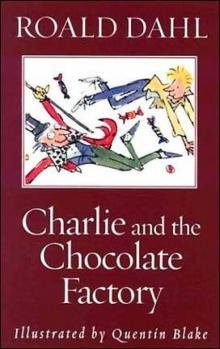 Charlie and the Chocolate Factory c-1
Charlie and the Chocolate Factory c-1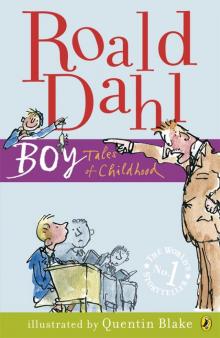 Boy
Boy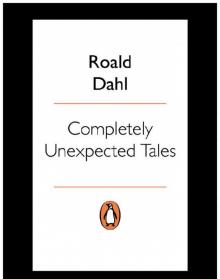 Completely Unexpected Tales
Completely Unexpected Tales Madness
Madness Innocence
Innocence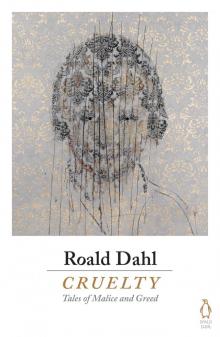 Cruelty
Cruelty George's Marvellous Medicine
George's Marvellous Medicine